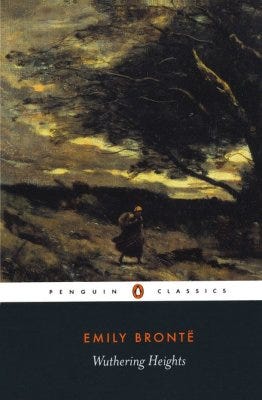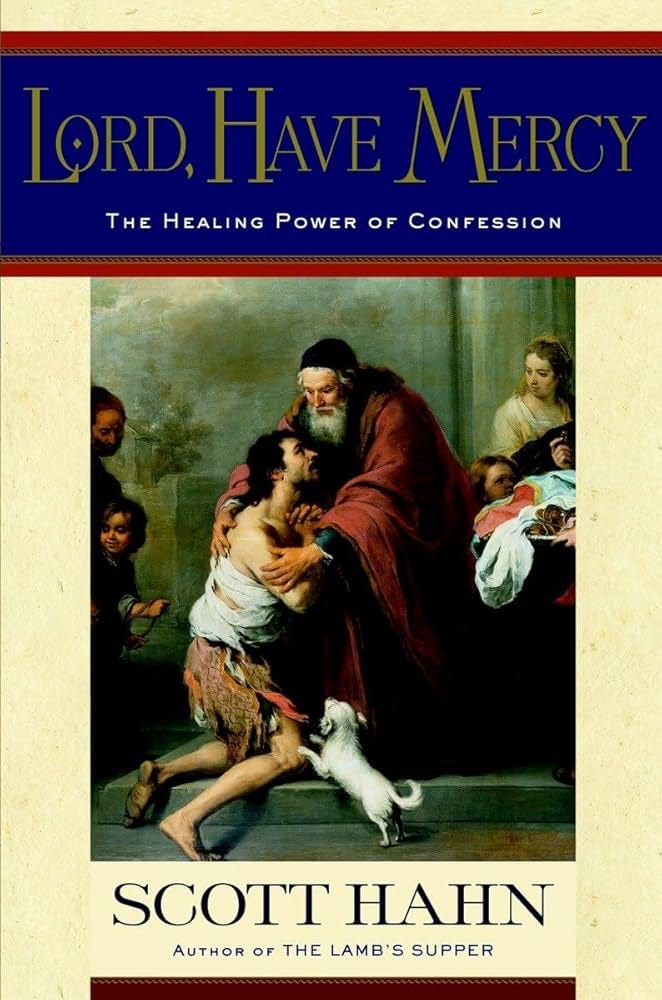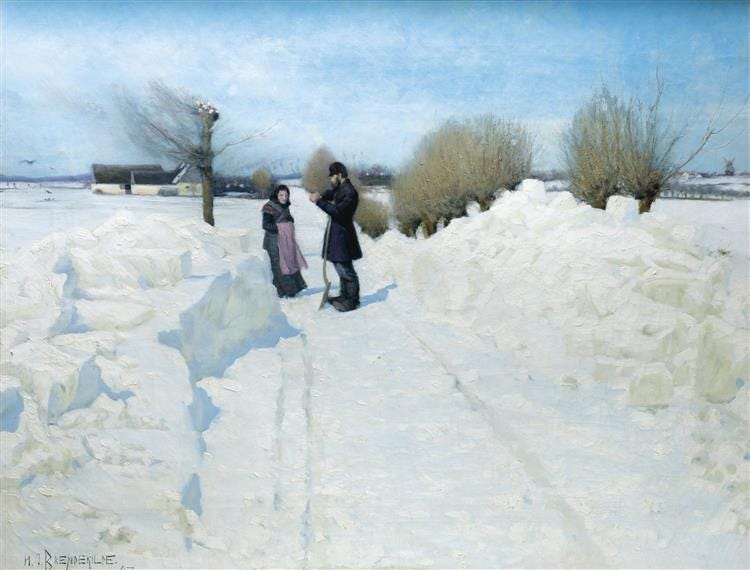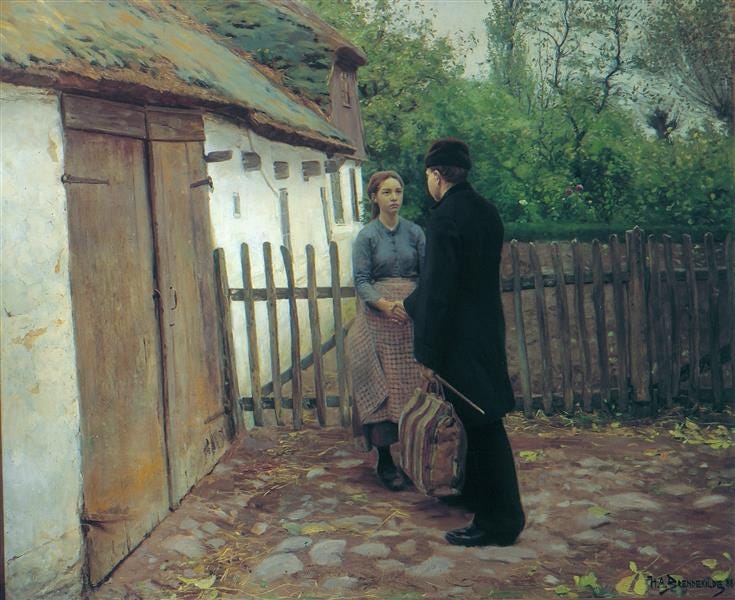Week 5 (2025)
seasonality & sacrifice in nature and parenthood, wealth & class, public vs. privatized spaces, communal affirmation vs. digitized versions
Click title to open in browser. You can reply directly to this email if received in your inbox.
to read: books
Wuthering Heights — Emily Brontë — Beautiful prose, atmospheric scene-setting, and deft weaving of a psychological doozy of a plotline. But geez louise I didn’t actually love the experience of reading it, bleak as it was. The book edition I had included commentary and discussion questions, and it mentioned that this book stood out in its time for ultimately glorifying suicide… and that Sylvia Plath was obsessed with it. Probably won’t revisit again.
Lord, Have Mercy — Scott Hahn — Fairly basic-but-beneficial reminders of the necessity and goodness of confession generally, and the Catholic view of the sacrament in particular.
to read: essays, articles, newsletters
Yards Are Not Enough: The Importance Of The Public Realm — Tiffany Owens Reed, Strong Towns — “The design decisions we’ve made in the U.S. over the past century have deprived us of that kind of vitality, replacing it with an extreme emphasis on privacy, the noise of automobiles, and the silence of people withdrawn from the public realm — because there is no public realm in most of our single-family neighborhoods.”
(related: The Vital Pleasure Of Existing In Public and Rediscovering “Third Place” Friendships In A Post-Pandemic World, shared previously — tangential thoughts on lonely sequestering vs. public mingling from , , in these comments)
- — “And yet, I meet so many people who rave about this town. They’re rich. They love the chi-chi frou-frou downtown historic district, with its four-star restaurants, cozy concert venues, e-bikes you can only rent if you have a smartphone and download the app, parking you can only access with a QR code, and waterfront parks with gourmet food trucks. They don’t ever use the public amenities that are so important to the rest of us… There’s a larger question here, way beyond libraries: who are public spaces and services for?”
(simply been appreciating her bluntly honest thoughts whenever I come across them…. ie: spicy working-class-homeschooling-family thoughts somewhere in these comments, or this or this.)
Jesus Changes Everything: What About Wealth? — Stanley Hauerwas, Church Life Journal — “Wealth, we assume, should create the power to do much good in the world. But wealth stills the imagination because we are not forced, as the first disciples of Jesus were, to be an alternative to the world that only necessity can create.”
The Hero And Other Cultural Characters —
Walks The World — “People do want material wealth, but that alone isn’t enough, because they also need to feel a sense of purpose aligned to the Good, and for men that means some version of being a hero, which is especially incoherent to the modern academic worldview that emphasizes individuality, because it requires being a part of a community, since it is an act of selflessness, where the hero trades their physical suffering for communal praise and status. You can’t be a hero if you are alone, because there is nobody to save or protect, and nobody to then sing your song… I also believe most of our current elites don’t understand how culture works, at almost any level. People don’t only need purposeful roles, the notion that someone can make up their own bespoke identity, like a tailor-made suit, might be true of a small minority of the highly educated and motivated, but the bulk of citizens in a society choose to, and would rather, play a stock character.”(related: his book Dignity and this conversation, shared previously — this essay had me thinking about ’s comment last week about Christian medieval vs. post-enlightenment ways of thinking about work, overflowing as it does into identity, status, and belonging)
The Digital Allure Of Being Attended To —
, You Are Not Your Own Substack — “Each man and each woman desires to be attended to by someone in a gaze of affirmation. This is built into us by design from God… Technology is only going to advance more and more rapidly, creating more opportunities to mimic the gaze of attention and affirmation we were designed for. It will commodify, analyze, distort, and bastardize that experience, if we allow it. Teasing us with fulfillment, while addicting us.”Surrender And Serenity— Isabel Rae McKenzie, Plough — “Addiction” comes from the Latin addicere, meaning “to devote, consecrate, sacrifice.” To worship. All my life, I wavered apathetically between agnosticism and atheism… why couldn’t I rationalize myself out of these self-destructive behaviors?”
- , Comment — “Only in the mutual giving of all things to all others can the world go on, and destruction threatens when one creature seeks only to take and never to give.”
We Need Cultural Change For Caregivers, Not Just Better Policy —
, Institute For Family Studies — “However, the reality is that the needs of children shift dramatically over the years, and work situations can shift and grow as the family does. This is a truth that needs amplifying.”(discussion here — related: ’s Seasons Of Motherhood And The Power Of Flexibility, shared previously)
- , Hearth & Field — “Instead of striving to remove all inconvenience and hardship there is both wisdom and joy to be had in reintegrating our lives with the rhythms and limitations of the seasons.”
My Daughter Asks For A Pomegranate — Rachel E. Hicks, Fare Forward —
“until just then I hadn’t cared to know
how slow love is, and what the parts are named.”(assistant editor at Mars Hill Audio?? talk about a dream gig, working with the interview legend Ken Myers himself)
to watch, listen to
Continuing On:
Black & Red All Over: A Classic Confessing Anglican Podcast with Steven Wedgeworth & Richard Tarsitano — Articles of Religion (Pt. 3) — Discussing Articles 11-14 — Alright, we’re getting to some of the explicit theological distinctives from Catholicism (coming down hard on the treasury of merit and the saints here). Anglicanism isn’t “Catholic Lite” so I will not abide this phrase! To paraphrase my husband, “Have the people who use that phrase even read the Book of Common Prayer?” Historic, confessional Protestantism was always meant to be adamantly Reformed Catholic (not anti-Catholic). But the distinctives remain.
The Natural Womanhood Podcast with
& Cassondra Moriarty — Season 2, Episode 8 — Making Space for Women's Bodies with — Leah was one of the first, if not the first, substack I subscribed to back in…. like, 2019? 2020? (I even met IRL in a surprisingly serendipitous way a couple years ago because of our crossed paths there.) This conversation was classic Other Feminisms thinking on interdependence—beyond our actual female bodies and motherhood, but certainly starting there—reminding me why I appreciate her work. They discuss themes from previously shared essays of hers, Designing Women and The Intimacy Of Imbalance.Woven Well Podcast with
— Episodes 35-36 — Client Story: Rachel & Evan (Avoiding Pregnancy) and Advocating in the Dr.'s Office: Asking Good Questions — “It’s turned into a way to partner with my wife… intimacy is two people and planning a family requires two people working in tandem, making decisions, doing the work… I cannot expect just my spouse to figure all this out.” (Boy do I have thoughts on how this typically plays out, or doesn’t, throughout a couples’ years of fertility.)“For me it was a lense of discipleship... We disciple people in every area of life… It has given us shared language, a stepping stone to talk about something that a lot of times people within the church are afraid to touch.” (!!!!!)
(more resources on female embodiment in the Big Ol' Compilation — and a welcome to FEMM instructor . Here’s her first post.)
to glean from: tip, product, resource
At the risk of turning this section into a ridiculous case of Curation Inception…
I was included in Ekstasis Curated, January among many others creating wonderful things, and it did indeed make me blush a little.
And at the request of exactly one person (I’ve been known to do this with book lists, too…. there’s a handful of tailor-made google docs floating around for different people who requested them over the years. Perhaps this is less a flex than evidence of list-making being a strangely satisfying pastime of mine, been doing it since I was a kid...) I made a post to hold all the Life Considered links variously related to the issue of pornography. (Some tweaks and updates have been made since initially creating it a few days ago.) *butterfly meme* Is this what putting together a syllabus feels like? In all seriousness, I hope and do pray it contains some teaspoons of goodness someone might need in an otherwise overwhelming ocean. As
put it: “We’re already in a storm of sexual brokenness and there’s a tsunami coming.”











![the [desecrated] body: a compilation](https://substackcdn.com/image/fetch/w_140,h_140,c_fill,f_auto,q_auto:good,fl_progressive:steep,g_auto/https%3A%2F%2Fsubstack-post-media.s3.amazonaws.com%2Fpublic%2Fimages%2F5c9d3ae9-c6b3-42ba-a5db-f5b7f91da982_555x600.jpeg)




Still mulling over medieval vs post-Enlightenment Christianity and the approach to work that flows from it, or perhaps rather from its approach to the world. The former is primarily receptive; the latter is primarily that of domination (man vs nature, via machine). I think reading enough original sources also would show that these are distinctly tied to Catholic vs Protestant ways of seeing the world, at least in so far as the theology is built on (or not built on) certain philosophies.
(I realize that’s a lot to say in one comment :) but it’s something I’ve been reflecting on lately… someday it may turn into an essay but I have a few others in the queue that need attention first!)
Okay, I'm rereading Wuthering Heights now and it's one of my favorite books so I feel I've got to do some defending 😆 This is a long excerpt from Virginia Woolf's essay "Jane Eyre and Wuthering Heights" but it really encapsulates part of why I love WH so much (it's worth reading, I promise!):
Wuthering Heights is a more difficult book to understand than Jane Eyre, because Emily was a greater poet than Charlotte. When Charlotte wrote she said with eloquence and splendour and passion “I love, ” “I hate,” “I suffer.” Her experience, though more intense, is on a level with our own.
But there is no “I” in Wuthering Heights. There are no governesses. There are no employers. There is love, but it is not the love of men and women. Emily was inspired by some more general conception.
The impulse which urged her to create was not her own suffering or her own injuries. She looked out upon a world cleft into gigantic disorder and felt within her the power to unite it in a book.
That gigantic ambition is to be felt throughout the novel — a struggle, half thwarted but of superb conviction, to say something through the mouths of her characters which is not merely “I love” or “I hate,” but “we, the whole human race ” and “you, the eternal powers . . .” the sentence remains unfinished. It is not strange that it should be so; rather it is astonishing that she can make us feel what she had it in her to say at all.